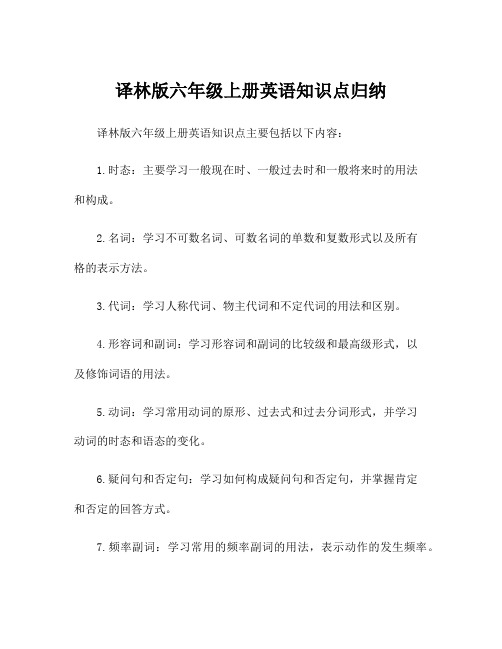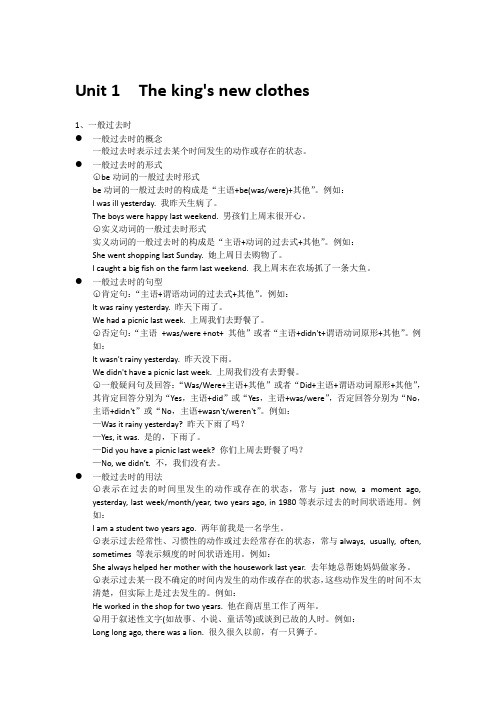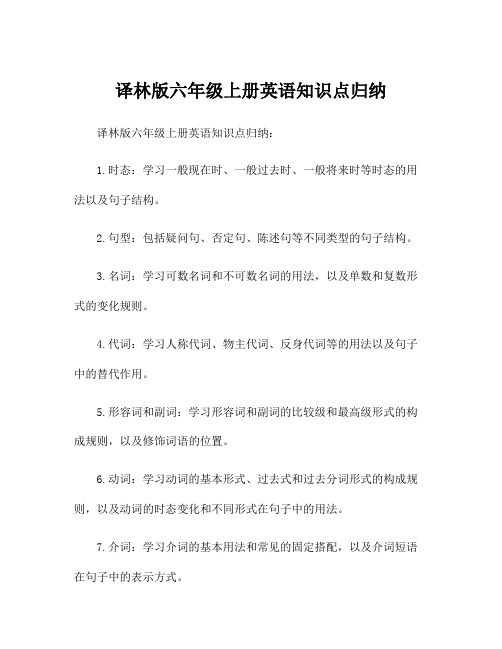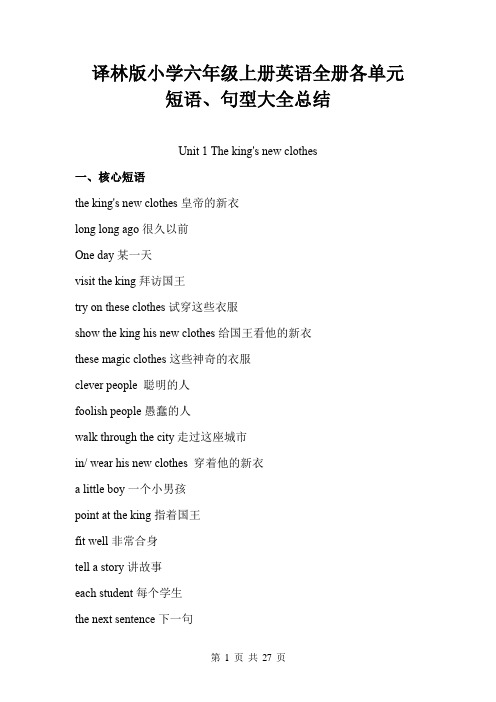译林版小学六年级英语上册知识点汇总
译林版六年级上册英语知识点归纳

译林版六年级上册英语知识点归纳译林版六年级上册英语知识点主要包括以下内容:
1.时态:主要学习一般现在时、一般过去时和一般将来时的用法
和构成。
2.名词:学习不可数名词、可数名词的单数和复数形式以及所有
格的表示方法。
3.代词:学习人称代词、物主代词和不定代词的用法和区别。
4.形容词和副词:学习形容词和副词的比较级和最高级形式,以
及修饰词语的用法。
5.动词:学习常用动词的原形、过去式和过去分词形式,并学习
动词的时态和语态的变化。
6.疑问句和否定句:学习如何构成疑问句和否定句,并掌握肯定
和否定的回答方式。
7.频率副词:学习常用的频率副词的用法,表示动作的发生频率。
8.数词:学习基数词和序数词的读法和用法,以及表示日期和年
龄的表达方式。
9.介词:学习常用的介词的用法和搭配,包括表示时间、地点和
方式等。
10.情态动词:学习情态动词的用法和意义,如can、could、may、might、must、shall、should、will、would等。
以上是译林版六年级上册英语知识点的归纳,希望能帮到你。
六上英语译林版知识点汇总

六上英语译林版知识点汇总
一、词汇
1. 四会单词:学生需要掌握四会单词,即会听、说、读、写。
这些单词包括常用的名词、动词、形容词、副词等。
2. 习惯用语:学生需要掌握一些常见的习惯用语,如问候、道别、感谢、道歉等常用表达方式。
二、语法
1. 现在进行时:学生需要掌握现在进行时的构成和用法,如“I am doing my homework now.”等。
2. 一般现在时:学生需要掌握一般现在时的构成和用法,如“I usually get up at 7 o’clock every day.”等。
3. 一般过去时:学生需要掌握一般过去时的构成和用法,如“She went to the park last weekend.”等。
三、语音
学生需要掌握元音字母及常见字母组合的发音,如“ea”、“ai”、“ay”等。
此外,还需要了解重音和语调的规则。
四、句型
学生需要掌握陈述句、疑问句和祈使句的构成和用法,如“I have a new friend.”、“Do you like apples?”和“Please sit down.”等。
五、情景交际
学生需要在不同的情境中运用所学句型进行交流,如购物、问
路、打电话等。
此外,还需要了解不同国家的文化和习惯用语。
新译林版六年级上册英语知识点归纳总结

Unit 1 The king's new clothes1、一般过去时●一般过去时的概念一般过去时表示过去某个时间发生的动作或存在的状态。
●一般过去时的形式○1be动词的一般过去时形式be动词的一般过去时的构成是“主语+be(was/were)+其他”。
例如:I was ill yesterday. 我昨天生病了。
The boys were happy last weekend. 男孩们上周末很开心。
○2实义动词的一般过去时形式实义动词的一般过去时的构成是“主语+动词的过去式+其他”。
例如:She went shopping last Sunday. 她上周日去购物了。
I caught a big fish on the farm last weekend. 我上周末在农场抓了一条大鱼。
●一般过去时的句型○1肯定句:“主语+谓语动词的过去式+其他”。
例如:It was rainy yesterday. 昨天下雨了。
We had a picnic last week. 上周我们去野餐了。
○2否定句:“主语+was/were +not+ 其他”或者“主语+didn't+谓语动词原形+其他”。
例如:It wasn't rainy yesterday. 昨天没下雨。
We didn't have a picnic last week. 上周我们没有去野餐。
○3一般疑问句及回答:“Was/Were+主语+其他”或者“Did+主语+谓语动词原形+其他”,其肯定回答分别为“Yes,主语+did”或“Yes,主语+was/were”,否定回答分别为“No,主语+didn't”或“No,主语+wasn't/weren't”。
例如:—Was it rainy yesterday? 昨天下雨了吗?—Yes, it was. 是的,下雨了。
—Did you have a picnic last week? 你们上周去野餐了吗?—No, we didn't. 不,我们没有去。
六年级译林版英语上册

六年级译林版英语上册一、单词部分。
1. 重点单词汇总。
- Unit 1 The king's new clothes.- clothes:衣服,是复数形式,没有单数形式的表达,例如:These clothes are beautiful.(这些衣服很漂亮。
)- king:国王,例如:The king is very rich.(这个国王非常富有。
)- foolish:愚蠢的,例如:Don't be so foolish.(不要如此愚蠢。
)- point at:指着,例如:Don't point at others.(不要指着别人。
)- Unit 2 What a day!- cloudy:多云的,是形容词,用来描述天气,例如:It's cloudy today.(今天多云。
)- rainy:下雨的,例如:We can't go out on a rainy day.(下雨天我们不能出去。
)- sunny:晴朗的,例如:It was sunny yesterday.(昨天天气晴朗。
)- windy:有风的,例如:It's windy in spring.(春天多风。
)- Unit 3 Holiday fun.- holiday:假期,例如:I had a great holiday.(我度过了一个很棒的假期。
)- fun:乐趣,例如:We had a lot of fun at the party.(我们在聚会上玩得很开心。
)- visited(visit的过去式):参观,拜访,例如:I visited my grandparents last week.(我上周拜访了我的祖父母。
)- Unit 4 Then and now.- ago:以前,例如:I lived in a small village five years ago.(五年前我住在一个小村庄。
译林版六年级上册英语知识点归纳

译林版六年级上册英语知识点归纳译林版六年级上册英语知识点归纳:1.时态:学习一般现在时、一般过去时、一般将来时等时态的用法以及句子结构。
2.句型:包括疑问句、否定句、陈述句等不同类型的句子结构。
3.名词:学习可数名词和不可数名词的用法,以及单数和复数形式的变化规则。
4.代词:学习人称代词、物主代词、反身代词等的用法以及句子中的替代作用。
5.形容词和副词:学习形容词和副词的比较级和最高级形式的构成规则,以及修饰词语的位置。
6.动词:学习动词的基本形式、过去式和过去分词形式的构成规则,以及动词的时态变化和不同形式在句子中的用法。
7.介词:学习介词的基本用法和常见的固定搭配,以及介词短语在句子中的表示方式。
8.冠词:学习"a"、"an"和"the"的用法和区别,以及冠词与其他词类的搭配。
9.数词:学习基数词、序数词和分数的表达方式及用法。
10.并列连词:学习并列连词的用法和表示方式,如"and"、"but"、"or"等。
11.程度副词:学习表示程度或强调的副词,如"very"、"too"、"so"等。
12.物体和物品:学习常见的物体和物品的名称,以及它们的形状、颜色、尺寸等特征描述。
13.动物、植物和自然界:学习不同种类的动物、植物和自然界的名称及特征描述。
14.基本日常生活用语:学习常见的日常用语,如问候、道谢、表达喜欢和不喜欢等。
15.时间、日期和季节:学习表示时间、日期和季节的词汇与句型。
16.地点和方位:学习表示地点和方位的词汇,如家、学校、街道、方向等。
17.格言和谚语:学习一些常见的格言和谚语,了解其中的含义和用法。
18.文化习俗和节日传统:学习不同国家或民族的文化习俗和节日传统,了解和欣赏多元文化。
以上是译林版六年级上册英语的知识点归纳,希望可以准确回答您的问题。
译林版小学六年级上册英语全册各单元短语句型大全总结

译林版小学六年级上册英语全册各单元短语、句型大全总结Unit 1 The king's new clothes一、核心短语the king's new clothes皇帝的新衣long long ago很久以前One day某一天visit the king拜访国王try on these clothes试穿这些衣服show the king his new clothes给国王看他的新衣these magic clothes这些神奇的衣服clever people 聪明的人foolish people愚蠢的人walk through the city走过这座城市in/ wear his new clothes 穿着他的新衣a little boy一个小男孩point at the king指着国王fit well非常合身tell a story讲故事each student每个学生the next sentence下一句think hard努力地想have to不得不in front of the house在房子前面;walk by the house步行经过房子shout at the old man对着老人大喊give me your child 把你的孩子给我be nice to her对她很好look after him照顾他turn into a prince变成王子二、重点句型1. My king, we can make new clothes for you.我的国王,我们可以给您做新衣服。
【解析】can为情态动词,后面跟动词原形;“make sth.for sb."意为“为某人制作某物",for为介词,后面如果跟人称代词需要用其宾格形式。
My mother can make dresses for me.我妈妈可以给我做连衣裙。
They are making a birthday cake for Su Hai.他们正在为苏海制作一个生日蛋糕。
六年级英语译林上册知识点
六年级英语译林上册知识点六年级英语译林上册是小学六年级学生所学习的英语教材,本册教材内容丰富,包含了许多重要的英语知识点。
在这篇文章中,我们将详细介绍六年级英语译林上册的知识点,以帮助学生更好地理解和掌握这些内容。
一、语法知识点1.过去进行时过去进行时用来表示过去某个时间正在进行的动作或状态。
其结构为“was/were + 动词的现在分词”。
例如:I was reading a book when the phone rang.(当电话响起时,我正在读书。
)2.被动语态被动语态用来描述主语是动作的承受者而不是执行者的句子。
其结构为“be + 过去分词”。
例如:The book was written by Tom.(这本书是由汤姆写的。
)3.情态动词情态动词用来表示能力、允许、必须等情态。
例如:can, must, should等。
例如:You must finish your homework before playing computer games.(你必须在玩电脑游戏之前完成作业。
)二、词汇知识点1.短语动词短语动词包括动词加副词、介词短语或副词短语构成的短语。
例如:get up, give up, look after等。
例如:She always looks after her younger brother.(她总是照顾她的弟弟。
)2.固定短语固定短语是指一组词的组合具有固定的意义,不能随意变动。
例如:in front of, on the way to, at the end of等。
例如:The post office is in front of the library.(邮局在图书馆的前面。
)三、阅读理解知识点1.主旨大意题主旨大意题要求理解文章的主旨或中心思想。
学生需要综合考虑文章的标题、段落信息和文章细节来确定主旨。
例如:What is the main idea of the passage?(这篇文章的主要观点是什么?)2.细节理解题细节理解题要求从文章中找到特定的信息或细节。
新译林版英语六年级上册知识点整理
知识点整理1、关于天气 (rain的各种形式变化)It rains/ rained.It is raining/ rainy.例:(1) It was rainy yesterday. It rained heavily.(2) Does it often rain in Suzhou? Yes. It often rains.(3) It is rainy today. Look, it is raining now.(4) There is a lot of rain in spring.2、关于天气的提问及回答What is/ was the weather like? = How is/ was the weather?It is/ was rainy/ cloudy/ snowy/ sunny/ windy …3、关于表示时间的介词的用法(1) in 表示较长时间,如月份、季节、某年、一般(非特指)的早、中、晚例:in March;in summer;in 2019;in the morning(2) on 表示具体某一天及早、中、晚例:on the second of September;on Sunday morning;on Chinese New Year’s Day(3) at 表示某一时刻或较短暂的时间,或泛指圣诞节,春节、复活节等例:at four;at noon/night;at Christmas/ Chinese New Year/ Easter(4) 在last, next, this, that, some, every 等词之前一律不用介词。
例:We took a bus to school last Monday.4、关于表示方法、手段、工具等介词的用法(1) in 表示用…方式,用…语言,穿着…例:in English;in red(2) by 表示以…方法、手段或泛指某种交通工具例:by metro(3) with 表示某用…工具、手段;长着…;带有…;戴着…;例:make a poster with some photos;a boy with big eyes;a cake with some strawberries;a girl with glasses;5、play的用法(1) 意为打、踢,后面加球类运动:play tennis(2) 意为弹拨、吹奏,后面加乐器:play the piano(3) 意为玩...或者同…一起玩:play with the toy cars6、what day 与what date 的区别(1) what day 是询问星期几(2) what date 是询问具体的日期7、excited与exciting的区别(1) excited 形容人:I am very excited.(2) exciting 形容事或者物:This football match is so exciting.8、news、paper 与newspaper的区别(1) news不可数名词:也可表达为a piece of news(2) paper不可数名词:也可表达为a piece of paper(3) newspaper可数名词9、感叹句(1) How+形容词!例:How nice!How beautiful the clothes are!(2) What+名词短语!♣ What a/an形容词+可数名词单数!例:What an interesting story!♣ What 形容词+可数名词复数!例:What beautiful clothes!♣ What 形容词+不可数名词!例: What exciting news!10、some 的用法,在以下句子中some不变:♣ Can/ Could/ May I have some juice?♣ Would you like some bread?♣ What/ How about some sweets?11、文化常识部分♣ This is an American cowboy. He’s wearing jeans.This is a Scottish man. He’s wearing a kilt.♣ There are three main school holidays in the UK. They are the Easter holiday, the summer holiday and the Christmas holiday.♣ The American invented the aeroplane.The British invented the train.♣ In the UK, people call the metro “underground”.In the US, people call the metro “subway”.♣ Earth Day is on 22nd April.World Environment Day is on 5th June.♣ Christmas is the most important holiday in the UK.Chinese New Year is the most important festival in China. We also call it “Spring Festival”.Thanksgiving is a very important holiday in the US.12、易考的固定搭配★like doing …例:He likes eating hamburgers.★would like to do… = want to do…例:I would like to visit my cousin.I want to visit my cousin.★how to do …例:I want to know how to protect the Earth.★help …do…或help …with…例:Trees help keep the air clean.Mike often helps me with my English.★show sb. sth.= show sth. to sb.例:The two men showed the king his new clothes.= The two men showed his new clothes to the king.★give sb. sth.= give sth. to sb.例:My grandpa gives me a red packet.= My grandpa gives a red packet to me.★be nice/ happy to do …例:It is nice to get your email.★make… for…或make … with…例:Please make a card for me.I will make a sentence with “egg”.★buy… for…或buy … from…例:I want to buy some cakes for my sister.I buy some sweets from a shop.★ask… to do(要求);ask …about (询问)或ask for help (求助)例:He asks me to sweep the floor.Tina asks Bobby about the show.She will ask her dad for help.★write … to例:He wrote a letter to his e-friend last night.★use … to例:We use wood to make tables.★reuse … to例:He can reuse paper to make a box.★wait for例:He waits for the answer.★say …to例:Let’s say “Happy New Year” to everyone.★come from= be from例:Wood comes from trees.= Wood is come trees.或Where are you from?= Where do you come from?★start doing例:Billy starts drawing.★tell … to do 或tell … about..例:He told the boy to clean the desk.Let’s tell them about it.★talk about例:We are talking about our winter holiday.★plan for例:They are talking about their plans for Chinese New Year.。
六年级英语上册译林
六年级英语上册译林一、重点单词。
1. 月份类。
- January(一月),February(二月),March(三月),April(四月),May (五月),June(六月),July(七月),August(八月),September(九月),October(十月),November(十一月),December(十二月)。
- 记忆方法:可以按照顺序编成口诀,如“January February,新年刚过忙三月(March)”等,也可以通过制作单词卡片,一面写单词,一面写中文释义和简单的月份特点(如January有新年等)来记忆。
2. 节日类。
- New Year's Day(元旦),Chinese New Year(春节),Mid - Autumn Festival(中秋节),Dragon Boat Festival(端午节)等。
- 对于节日类单词,可以结合节日的文化习俗来记忆。
例如,对于Dragon Boat Festival,可以联想龙舟比赛、吃粽子等习俗,这样能更好地记住单词。
3. 日常活动类。
- have breakfast(吃早饭),have lunch(吃午饭),have dinner(吃晚饭),go to school(去上学),go to bed(去睡觉),get up(起床)等。
- 可以通过模拟日常场景对话来练习这些单词的使用。
比如和同学互相问答:“What time do you get up?”“I get up at six o'clock.”二、重点句型。
1. 询问日期。
- What date is it today? It is + 日期(如the first of June)。
- 在练习这个句型时,可以制作一个简单的日历,每天互相询问日期,加深印象。
2. 询问节日。
- What festival is in + 月份?- 例如:What festival is in January? There is New Year's Day in January.3. 日常活动时间安排。
译林英语六年级上册全册重难点知识点梳理
Unit1 短语、词汇、知识点梳理一、短语1.皇帝的新衣the king’s new clothes2. 某一天one day3.很久很久以前long long ago4. 拜访国王visit the king5.两个男子/女子two men/women6. 试穿try on7.为你做新衣服make new clothes for you8.给国王看他的新衣show the king his new clothes9.这些魔法衣these magic clothes 10. 在街上in the street 11.聪明的人clever people 12.愚蠢的人foolish people 13.看见他们see them 14.穿过城市walk through the city15.穿着他的新衣in his new clothes / wear his new clothes16.有许多人。
There were a lot of people.17.看着国王look at the king18.多么漂亮的衣服啊!What beautiful clothes!=How beautiful the clothes are!19.一个小男孩 a little boy 20.指着国王point at/to the king 21.非常合身fit well 22.今天下午this afternoon23.一张来自我好友Mark的卡 a card from my good friend Mark24.来参加我的聚会come to my party 25.在四点半at half past four 26.在公园里in the park 27.一个美国牛仔an American cowboy 28.穿着牛仔裤wear jeans 29.一个苏格兰男士a Scottish man 30.穿一条苏格兰裙wear a kilt 31. 讲故事tell a story32.狐狸老师和她的学生们Miss Fox and her students33.每个学生说一个句子。
- 1、下载文档前请自行甄别文档内容的完整性,平台不提供额外的编辑、内容补充、找答案等附加服务。
- 2、"仅部分预览"的文档,不可在线预览部分如存在完整性等问题,可反馈申请退款(可完整预览的文档不适用该条件!)。
- 3、如文档侵犯您的权益,请联系客服反馈,我们会尽快为您处理(人工客服工作时间:9:00-18:30)。
译林6年级上册英语知识点汇总6A Unit 1 The king's new clothes一.Words:magic有魔力的,神奇的clever 聪明的foolish 愚蠢的child 孩子through 穿过laugh 笑,大笑wear 穿tell 讲,叙述hard 努力地,费劲地each 每个say 说sentence 句子quick 迅速的,快的next 下一个little 小的,年幼的turn 机会think 想,思考二.Phrases:long long ago 很久以前turn into 变成one day 一天try on 试穿walk through 走过look at 看point at 指着laugh at 嘲笑look after 照顾in the street 在街上on the mountain 在山上in the house 在房子里in the forest 在森林里make new clothes 做新衣服三.Sentences:1.Long long ago,there was a king. 很久以前,有一个皇帝。
2.One day,two men visited the king. 一天,两个男人拜访了皇帝。
3.The king was happy. 皇帝很高兴。
4.What beautiful clothes! 多么漂亮的衣服啊!5.The two men showed the king his new clothes.那两个男人给皇帝展示了他的新衣服。
6.Miss Fox and her students are playing a game.狐狸老师正在和她的学生们玩游戏。
四. Grammer:1.概念在过去某个时间里发生的动作或存在的状态:过去习惯性或经常性的动作、行为。
2.时间状语ago,yesterday,the day before yesterday,last week(year,night,month…),in 1989,just now,long long ago,once upon a time.3.肯定句主语+行为动词(过去式)+其他。
例如:I was born in 1998. 我在1998年出生。
My grandfather died last year.我(外)祖父去年去世了。
4.否定句:主语+didn’t+行为动词(原形)+其他。
例如:He didn’t do his homework yesterday. 他昨天没有做他的家庭作业。
I didn’t know you were here. 我不知道你在这儿。
6.一般疑问句Did+主语+行为动词(原形)+其他?肯定回答:Yes,主语+did.否定回答:No,主语+didn’t.例如:---Did you go to the zoo last week? 你上周去动物园了吗?---Yes,I did. 是的,我去了。
7.动词过去式的规则变化和一些不规则变化构成方法:1) 一般在动词词尾直接加-ed. help-helped,clean-cleaned, visit-visited,show-showed, walk-walked, look-looked, shout-shouted, point-pointed2) 以不发音的字母e结尾的动词,在词尾直接加-d.live-lived,move-moved, like-liked,3) 以辅音字母加y结尾的动词,变y为i,再加-ed. study-studied,cry-cried4) 以一个元音字母加一个辅音字母结尾的重读闭音节动词,先双写末尾的辅音字母,再加-ed. plan-planned,stop-stopped不规则变化(特殊记忆):am/is-was, are-were, go-went, meet-met, see-saw, do-did, get-got, read-read6A Unit 2 What a day!一.单词:sunny晴朗的show展览,展示interesting 有趣的,有意思的weather 天气become 变成,成为windy 有风的honey 蜂蜜cloudy多云的high在高处drink饮料ant蚂蚁bee蜜蜂cloud云rain下雨rainy多雨的meet 遇见lose 丢失know知道二.短语:in the moring/ afternoon在上午/下fly kites high放风筝放的高go to the park by bike 骑自行车去公园 a parrot show 鹦鹉展览some interesting parrots一些有趣的鹦鹉some ants 一些蚂蚁become windy and cloudy 变得既有风又有云in the sky 在空中bring some dumplings 带一些饺子black clouds 乌云hungry and wet 又饿又潮湿the New Year 新年lose my new kite 丢失了我的新风筝fly high 飞得高near the hill 在小山附近climb up the hill 爬上小山hold onto 抓紧fly away飞走go swimming 去游泳watch a film 看电影have a picnic 野餐do the housework做家务look sad 看起来伤心cheer together 一起庆祝三.重要句型A.It was sunny in the morning. 早上天气晴朗。
B.What happened? 发生了什么事?C.What’s the matter? 怎么了?(询问身体状况)D.We saw many interesting parrots. 我们看见了许多有趣的鹦鹉。
E.But it wasn’t windy in the park. 但是公园里没有风。
F.What a day! 真是多变的一天!G.Well done! 做得好!四.语法点:1.表示天气的形容词warm cool hot coolsunny windy cloudy rainy snowy2.形容词的用法:3.形容词可以修饰名词,一般放在名词的前面。
如:It’s a sunny morning .是一个晴朗的上午。
4.形容词用于系动词(be,get,look)的后面,用来说明主语的特征。
如:It was rainy yesterday.昨天是个下雨天。
5.形容词可以和副词连用,由于副词的强调作用,所表达的意思更深一层如:The jacket is too small for me .这件夹克衫对我来说太小了。
2.描述过去天气的句型-------It was+表示天气的形容词+其他。
Eg: It was sunny in the morning . 早上天气晴朗。
在描述天气时,我们可以用it 来代指天气。
因为描述的是过去的天气,所以be 动词用was,后面接表示天气的形容词。
Eg: It was cold in Changchun last winter.去年冬天长春很冷。
3.动词过去式的不规则变化fly—flew , grow--grew, draw--drew, sing--sang, drink--drank,give--gave, sit--sat, begin--began, swim--swam, run--ran,get--got, forget--forgot, read--read, put--put, write---wrote,is/am--was, are--were, do/does--did, have/has--had, eat--ate,go--went, make--made, see--saw, tell--told, take--took,buy--bought, catch--caught, teach—tought find--found, hear--heard,meet--met, say--said, sleep--slept, sweep--swept, stand--stood,steal--stole, think--thought, will--would, speak--spoke, feel--felt,come--came4.1)be动词的过去时的肯定句式,结构为:主语+was/were+其他。
Eg: The girl was in the zoo last Sunday. 那个女孩上个星期天在动物园。
There were some bananas on the table this morning. 今天早上桌子上有一些香蕉。
2)be动词的过去时的一般疑问句式,结构为:was/were+主语+其他+?Eg: Was the girl in the zoo last Sunday? 那个女孩上个星期天在动物园吗?Were there any bananas on the table this morning?今天早上桌子上有一些香蕉吗?3)be动词的过去时的否定句式,结构为:主语+was/were+not+其他。
Eg: The girl wasn’t in the zoo last Sunday. 那个女孩上个星期天没在动物园。
There weren’t any bananas on the table this morning.今天早上桌子上没有一些香蕉。
6. 实义动词的过去时的肯定句式,结构为:主语+动词的过去式+其他。
Eg: We saw many interesting parrots. 我们看见了许多有趣的鹦鹉。
We watered flowers this morning. 我们今天早上浇花了。
He climbed the mountains yesterday. 他昨天爬山了。
6A Unit 3 Holiday fun1. 单词:Holiday假期call 打电话excited (某人)感到兴奋的interesting(某事或某物)有趣的paper 纸ask 问star星星Bund 外滩bottle 瓶子2. 短语:come back to school 回到学校National Day 国庆节visit his aunt 探望他的阿姨go to the Bund 去外滩visit the Shanghai Museum 参观上海博物馆great fun 十分有趣many interesting things 许多有趣的事物go to the farm 去农场pick some oranges 摘橙子go fishing 去钓鱼catch a big fish 捉了一条大鱼live in 居住在Great Wall 长城Palace Museum 故宫Summer Palace 颐和园Tian’anmen Square 天安门广场the Easter holiday 复活节假期the Summer holiday 暑假the Christmas holiday 圣诞假期come home late 回家晚了go well 进展顺利fashion show 时装秀at first 起初heavy rain 大雨惯用表达:1. That’s cool. 那很酷。
